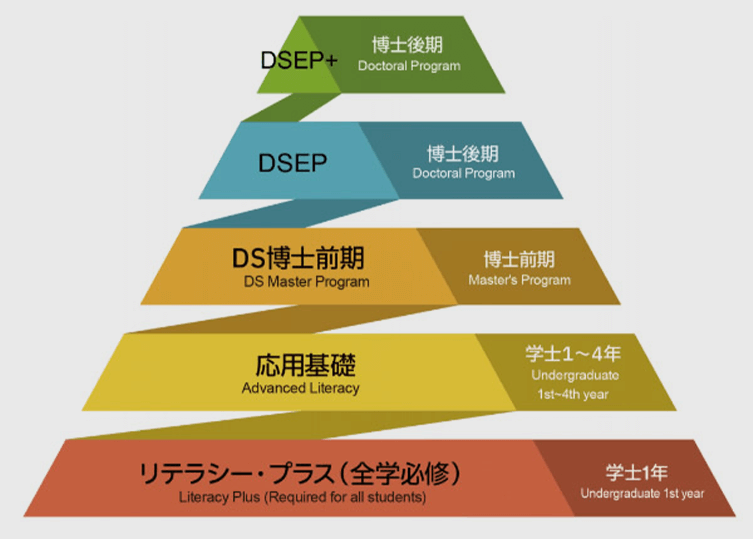
Overview
Information Education at the
University of Tsukuba
Since its opening in 1973, the University of Tsukuba has offered two credits for Information subjects as a common subject for all undergraduate students, with the aim of acquiring basic information literacy and computer skills. Furthermore, considering that the need for objective judgment and decision-making based on data is strongly recognized in society, for students entering in 2019 and onward, the existing 2 credits of the common subject Information was changed to 1 credit of Information Literacy (lecture) and 1 credit of Information Literacy (practical) with 2 credits of Data Science being newly established as a required subject for all undergraduate students, for a total of 4 credits.
At the time, this was the first initiative in Japan and one of the first in the world to require all students at a large university offering education in a wide range of fields, including humanities, life sciences, science and engineering, information science, medicine, physical education, and the arts, to take a compulsory subject of advanced information education, including lectures and computer-based practical exercises.
University-wide Education System
for Mathematics,
Data Science, and AI from Undergraduate
to Doctoral Programs
In terms of information education, the University of Tsukuba focuses on developing information technology experts and professionals capable of applying information and data sciences across various fields. Emphasizing the integration of mathematics, data science, and AI (MDA) to address interdisciplinary challenges, the University of Tsukuba has strengths in both research and education.
Building on its accomplishments, the University established the Headquarters for Interdisciplinary Education on Mathematics-Data Science-AI in 2021, led by the Vice President and Executive Director for Education, to develop a comprehensive MDA educational framework from the undergraduate to doctoral levels, enhancing MDA education across the University of Tsukuba as shown in the figure.

Features of Each Program
-
Undergraduate Education
View details
We offer a Data Science Literacy Program and a Data Science Advanced Literacy Program.
The Data Science Literacy Program is designed to ensure professionalism and interdisciplinarity while enhancing the motivation to learn MDA through efforts such as a curriculum that emphasizes practical skills, the design of teaching materials that incorporate the results of educational effectiveness measurements, and examples of data applications in various academic fields.
The Data Science Advanced Literacy Program is a program with the objective of learning basic concepts, methods, and applications related to mathematics, data science, and AI based on the knowledge of the Literacy Program, as well as acquiring practical skills through practical exercises and project-based learning. The program aims to help students acquire the ability to extract meaning from data and make effective use of it, as well as the ability to use data science and AI to solve problems.
-
Graduate Education
View details
Through dialogue with society, we aim to nurture innovators who understand systems, information, and society from a cross-sectional perspective, have both a global perspective and local practical skills, and have the exceptional ability to transform society, using data-based solutions to address complex and difficult problems in the real world. In order to do so, we have established the Data Science Expert Program (DSEP) and Data Science Expert Program Plus (DSEP+) in our doctoral courses.
DSEP and DSEP+ are programs that provide a foundation of specialized education in each of the degree programs for Systems and Information Engineering, and encourage research activities and thesis writing through interdisciplinary integrated research while collaborating, sharing data and co-creating with research institutions, companies, local governments, and other organizations in Japan and abroad. These programs are designed to develop doctoral candidates who have both the professional analytical skills as well as the practical skills to propose solutions to problems, and provide a certificate of completion to students who fulfill certain completion requirements.
-
Data Science Casebank
View details
Social issues can happen anytime, anywhere, and to anyone.
The Data Science Casebank does not provide a single answer to an issue, but rather offers multiple paths to the solution, depending on the issue. Students and researchers at the University of Tsukuba propose ways to solve issues they have explored based on data science. Some methods lead to solutions, while others are dead ends.
Here we share the results of our efforts to challenge the unknown, including the process of trial and error.
-
External Collaboration
View details
To promote MDA education, we conduct various collaborative activities with companies as well as government, research, and educational institutions. Major collaborative activities include industry research seminars, company questionnaires, matching seminars, and the MDA Talent Development Strategy Partnership Agreement.
If you feel that you want to utilize data to solve your organization's problems or promote DX, but lack the human resources, time, or opportunities to do so, come join the University of Tsukuba's Data Science Expert Program and together, we can make a difference in your organization and in society.
MDA教育活動概要に関する過去の広報
筑波大学のMDA教育プログラム:データサイエンス百景(2024/1/19)
データサイエンスリテラシー教育:大学教育と情報(2022年12月号)
理工学群におけるデータサイエンス応用基礎教育:大学教育と情報(2024年3月号)
MDA教育の意義:TOSHIN TIMES(2024/10/1、p.12-13)
